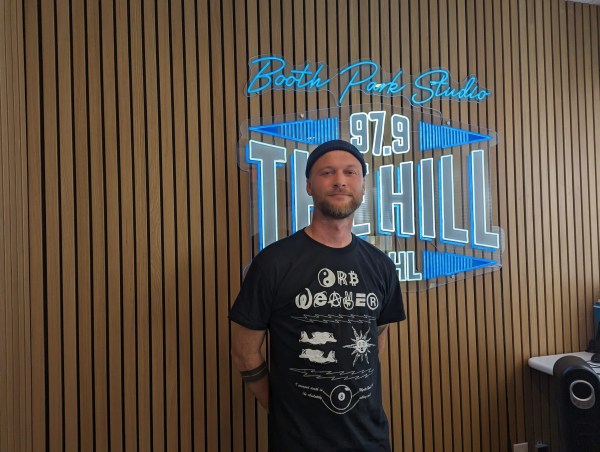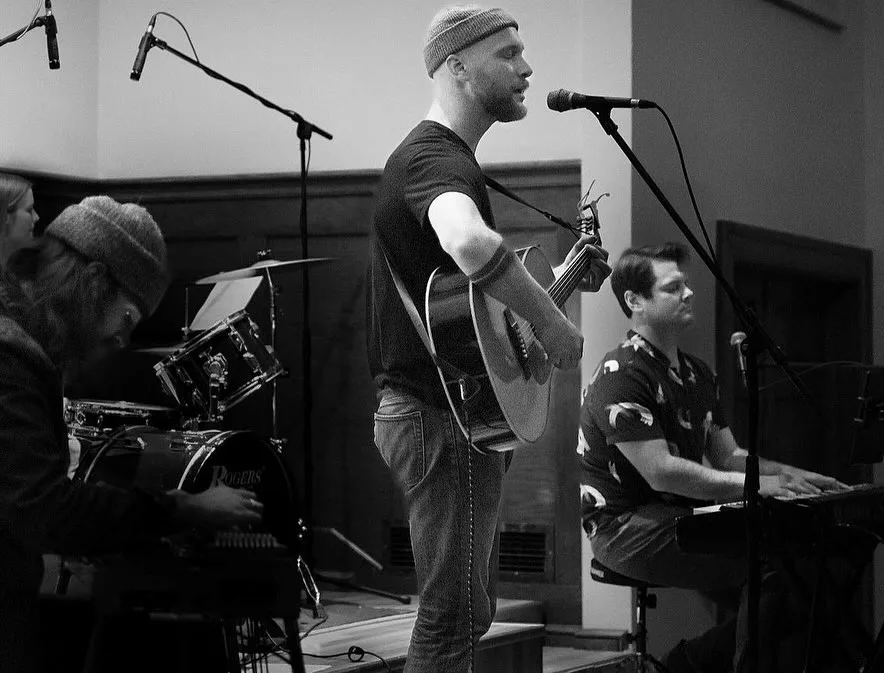Header photo credit: J Candeed
Lonnie Rott describes his relationship with music as “a log floating on the river.” Someone who lets friends curate what comes his way rather than actively seeking out the latest releases. It’s a fitting metaphor for an artist whose own musical journey has been similarly organic, drifting from classic rock obsessions to emo phases before settling into the folky Americana sound that now defines his work.
After years of writing songs in relative privacy, Rott has taken root in Durham’s collaborative music scene. His recent album, Whistling in the Dark, features contributions from a who’s who of local musicians—from Tim Harper and Saman Khoujinian (T. Gold) to Charles Cleaver, Libby Rodenbough (Mipso), and Chessa Rich—and his upcoming release promises more of the same community-centered approach to songcraft. He also added his voice to our Mountains to Sea Vol. 1 benefit compilation for Western North Carolina.
What makes Rott’s story compelling isn’t just his evolution from bedroom songwriter to performing artist, but how Durham’s tight-knit creative community has shaped that transformation. In an age where collaboration often feels transactional, Rott has found genuine artistic kinship built on trust, vulnerability, and shared risk-taking.
What is something you’ve been listening to lately?
Lonnie: Joseph Decosimo has a record that just came out [Fiery Gizzard]. He does old-time music and is based here in Durham. It’s really worth checking out. I’ve also been listening to the Townes Van Zandt record, Our Mother the Mountain, and Nathan Bowles Trio, another locally based artist who does acoustic jazz.
What is the first musician that you remember discovering on your own and obsessing over?
Lonnie: The earliest music memory I have is my dad giving me a cassette tape of Dave Brubeck’s Take Five. I loved that album and still do, but I didn’t find it on my own. Growing up, my email address was hendrixandzeppelin [at] hotmail.com, which reflected my obsessions in high school.
The first artist that felt like my own discovery was Ben Folds Five. Something about those first two albums was like a mix of punk and piano, but they’re also dorky in a cool way. I’m not sure, but I liked it a lot.
How has your musical taste changed since then?
Lonnie: I don’t think too much about it. Some of my friends are hardcore; they know what’s going on and really keep up with what’s coming out. I’m like a log floating on the river when it comes to what I listen to. Stuff comes to me. It’s almost like I let my friends curate things. I know music by people around me a lot more than I usually know popular stuff. By the time I find out about MJ Lenderman, it’s as if everyone already knows.
In a way, it’s followed the standard trajectories of somebody who’s my age. There’s the classic rock phase where everything new is bad. Then, I got into emo with bands like The Juliana Theory and Dashboard Confessional. And then I pivoted into an Americana-fused version of that, which went to contemporary old-time music.
I was raised with bluegrass and country around. But if I liked Hendrix or something, then I hated bluegrass. Old Time music was always there as this ambient background noise. It grew into kind of a gift that I finally accepted when I was like 25 or 26. In the last 5-10 years, I feel like I’ve been rediscovering stuff I should have already known like 90s hip-hop or 50s jazz.
What drew you to leap from being a music consumer to a more active participant?
Lonnie: I started playing guitar in 7th grade, but I was always making my own music poorly. I didn’t care as much about new artists unless something really blew me away. Wilco’s Yankee Hotel Foxtrot is a good example of one that I listened to until I couldn’t anymore.
I was around 16 years old when I started writing songs more seriously. Either I had emotions I was overwrought with or I wanted to impress a girl or something. It’s been a near constant for 25 years or so now.
Then about 5 years ago, I started making the transition from writing to actually performing live. In some ways, COVID might have had an effect. I’ve seen a lot of folks reassess and burst back out after the pandemic. For me, I started sharing songs that I had been working on forever and meeting folks around Durham who encouraged me to keep going. Discovering that community of kind, receptive, and talented makes it feel sort of collaborative.

How has that transition been for you?
Lonnie: A bit weird, since it’s something I did for so long but only have been public with for a few years. Not long ago, I was a part of a group that Chessa Rich led on The Artist’s Way. Part of what that was about for me was working through a division in my mind between “real artists” who do this professionally and everybody else.
In another setting, I remember Skylar Gudasz saying that divide isn’t as firm as people think it is because most of us are working other jobs. It’s very rare for somebody to only be making money from their art. There’s no impermeable boundary to seeing your work as real art. It’s changed how I’ve come to conceive of myself as a person, one who can claim that “artist” label even though it sounds grandiose and I feel funny even saying it right now.
That’s how I feel about calling myself a journalist.
Lonnie: Exactly. Even though it’s the description of the work you do. And you do it for the love of the game, not because you’re tied to other incentives. Saman Khoujinian showed me a video of Werner Herzog talking about why he loves skateboarding and it’s the same thing. They’re not doing it because they’re trying to get famous, but because they love it so much. There’s a beauty to that.
The more I’ve played out or made the songs I write available to hear, the more it feels natural to do. People either like it or they don’t.
Your music’s credits include a “who’s who” of local musicians. How does collaboration play into your songcraft?
Lonnie: That’s one of the things I love most about making music. It’s fun to collaborate with other people. I want to meet more folks who create and are excited to work together. It’s rough out there, so we need to have each other’s back and focus on having a good time.
There is a small group of folks I work with who I can trust to send whatever I’m working on, and they’ll edit it or whatever. That feels pretty vulnerable to me, like “here’s a song about how I’m depressed and lonely.” Not everyone could get that and feel comfortable reacting to it.
When it’s time to go from writing to recording, I’m thinking, “What is this supposed to sound like?” That’s where Saman or Charles Cleaver, as producers, really shine. I feel like they should get co-writing credit or something because they’reso instrumental to what the songs end up sounding. I usually don’t have a final vision for how the songs are gonna sound on the record. It’s kinda like we’ll see when it’s done.
There’s so much to be said for having people you trust provide you with that critical feedback you need most.
Lonnie: That’s exactly right. I’m trusting them more than I’m trusting some sort of finalized product. That also means something can be done that doesn’t match this non-existent vision in my head. There can be disappointment in that because I have to let it go, it doesn’t correlate with it being bad or people not liking it.

Image credit: 97.9 The Hill WCHL
What was the process for writing and recording Whistling in the Dark. Is that similar for this upcoming record you’re working on?
Lonnie: Basically, I write a lot. They’re not all good, but I always have a lot of songs. My friend Owen FitzGerald helped me think through how they thematically punch. Like, “these five are all about death” or something. These feel like they should fit together. And then the ones coming out are all angry folk tunes about anti-capitalism, so it felt like those fit. That’s how I think about it.
I have a bunch right now that I’m wrestling around with, written variously for folks not as a gift, but as an encouragement. I might not be able to do much, so I wrote a song to offer some support.
What are some of your goals for the rest of 2025 and beyond?
Lonnie: Definitely getting this record out. I’m playing a show in October with David Prather and Danny Grewen at The Cave. I’m planning on playing a completely piano set, which is something different to keep me from being bored. I’ll also be recording a song in September that’s a big deal project for me.
Who are your favorite local/North Carolina bands?
Lonnie: Owen FitzGerald is a genius. Chessa Rich is, besides one of my closet friends, an impeccable musician. Skylar Gudaz is amazing. Casey Toll, who plays with Nathan Bowles Trio. Sugaree String Society is a fantastic bluegrass band. Kill the Buddha is amazing. Blue Cactus, obviously.
I also love Nightblooms, Dissimilar South, and DUNUMS.
This interview has been edited for length and clarity.


Leave a Reply